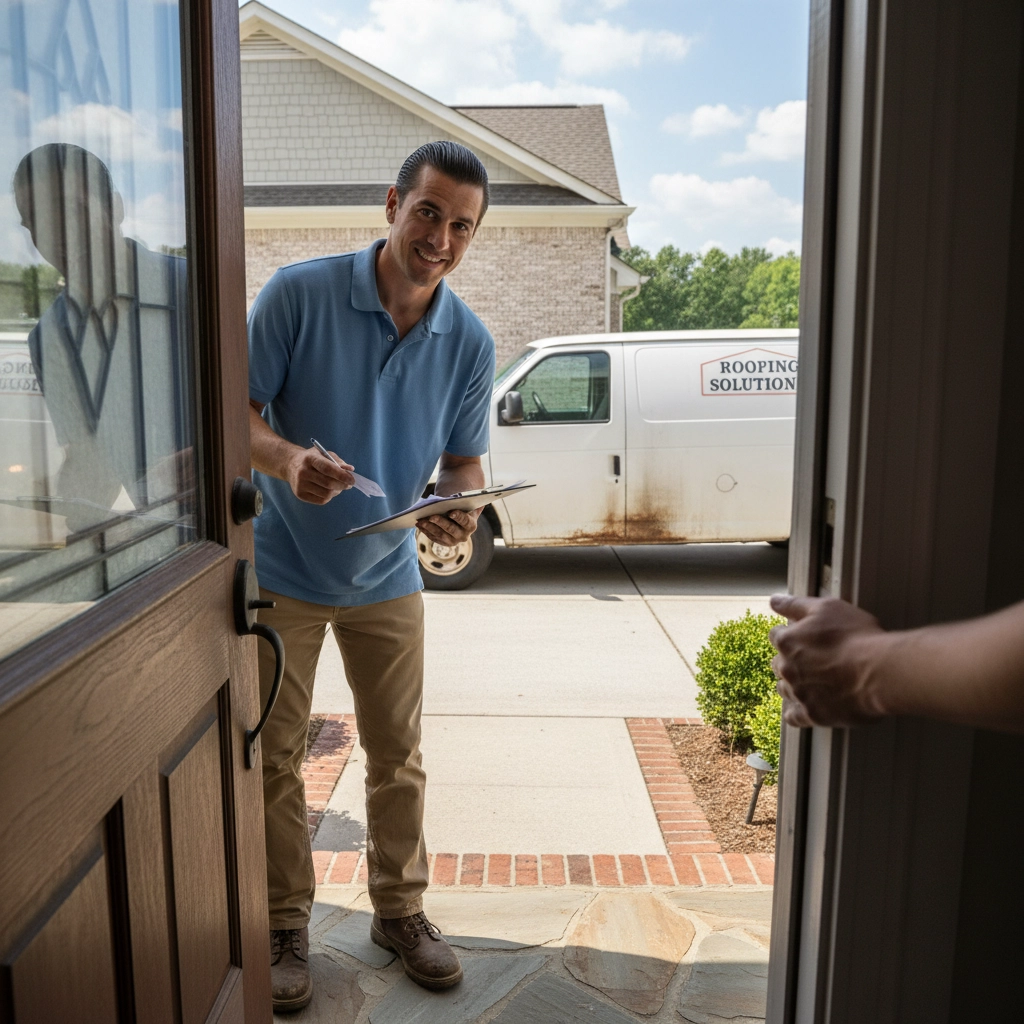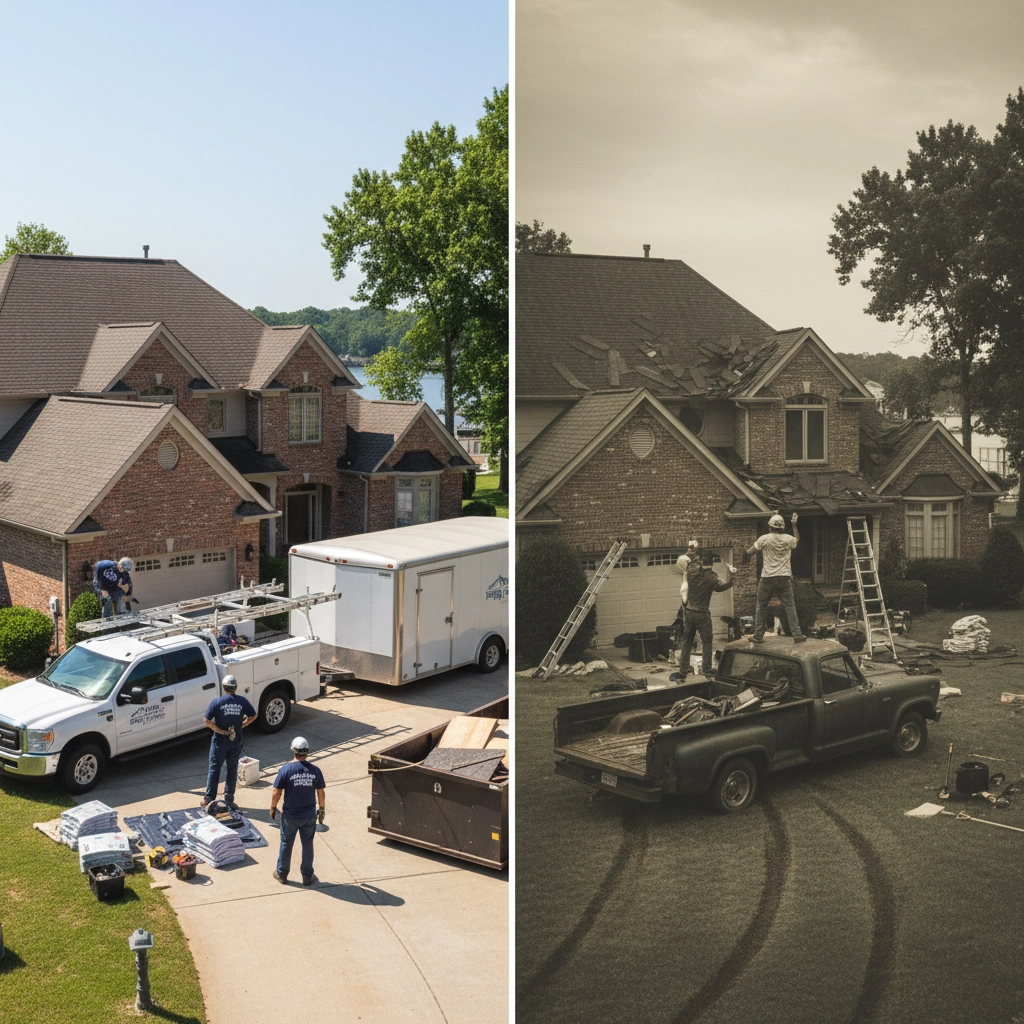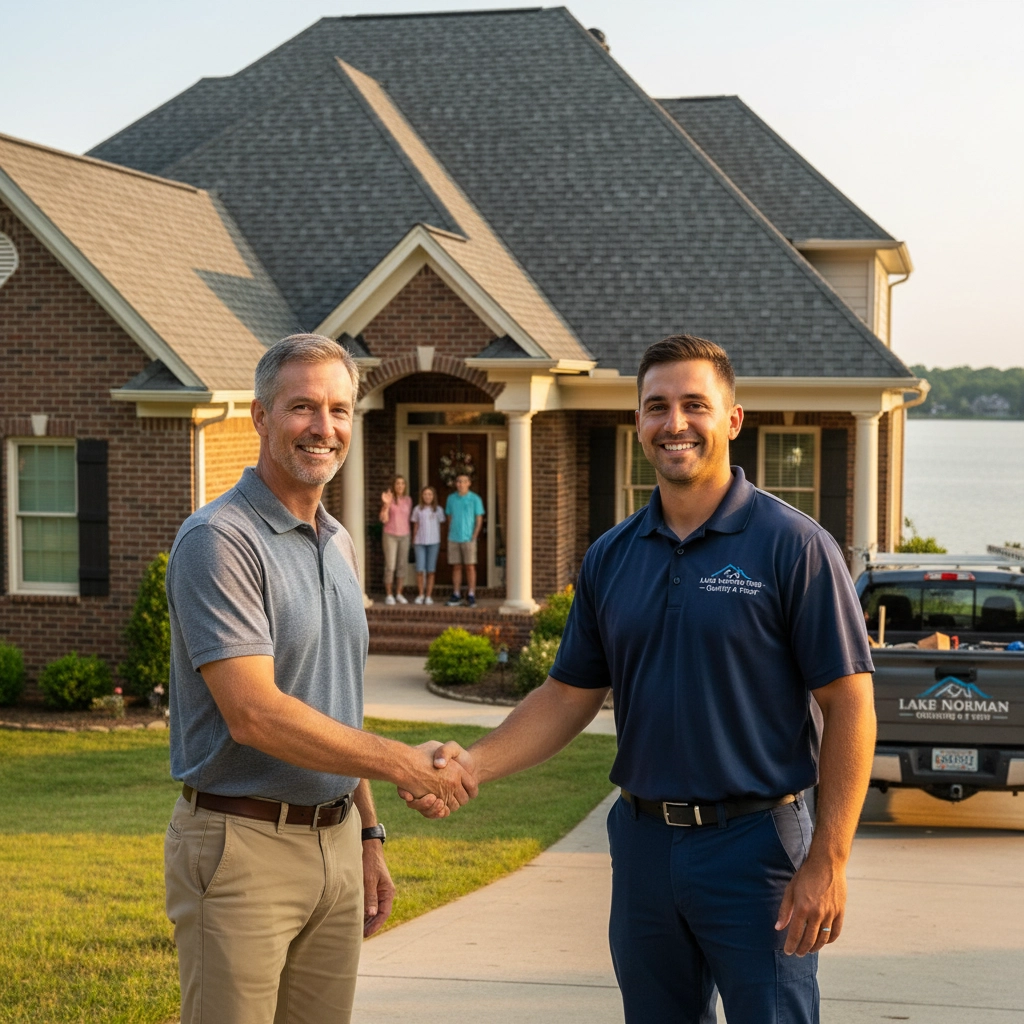Roofing Tips & Guides
Expert Roofing Advice for Charlotte Homeowners
Learn from Charlotte's trusted roofing experts. Tips on maintenance, repair, replacement, and protecting your home from the elements.
Learn from Charlotte's trusted roofing experts. Tips on maintenance, repair, replacement, and protecting your home from the elements.


Lake Norman homeowners, we need to talk. I’ve been roofing in this area for years, and I see it happen too often. Families get taken advantage of by dishonest contractors. They lose thousands of dollars. Sometimes they end up with roofs that leak worse than before.
Here’s the thing – I don’t know every roofing company around Lake Norman. But I do know the warning signs that scream “stay away!” Whether you’re looking at a company called LKN Roofers or any other contractor, these red flags will protect you and your family.
Your home is probably your biggest investment. Don’t let a scammer ruin it. Let me share what I’ve learned from helping thousands of homeowners avoid these traps.
Picture this: You’re having coffee on a Saturday morning. Someone knocks on your door. “Hi there! I was just working down the street and noticed some damage on your roof. Mind if I take a look?”
Stop right there. ⚠️
Good roofing companies don’t work this way. We’re usually booked weeks in advance. We don’t have time to drive around looking for work.
Here’s what these door-knockers often do:
I’ve seen contractors actually damage roofs during these “free inspections.” They’ll pull up a shingle, take a photo, and say “See this problem? It’s getting worse every day.”
What to do instead: If someone comes to your door, be polite but firm. Say “Thanks, but we work with a local company for our roofing needs.” Even if you don’t have a roofer yet, this usually makes them leave.
Never let a stranger climb on your roof. If you’re worried about damage, call a local company you can verify and trust.

Every legitimate roofing contractor needs two things: a license and insurance. If they can’t show you both, walk away.
In North Carolina, roofing contractors must have a license for jobs over $30,000. But here’s what I tell every homeowner: even for smaller jobs, ask to see their license anyway. It shows they’re serious about their business.
Insurance is even more important. What happens if someone gets hurt on your property? What if they damage your house or your neighbor’s car? Without insurance, you could be responsible for thousands in damages.
Real story from last month: A homeowner in Cornelius hired an unlicensed contractor to fix some shingles. The guy fell off the roof and broke his leg. Guess who got sued? The homeowner. Their insurance covered some of it, but they still paid $15,000 out of pocket.
How to verify credentials:
Don’t just take their word for it. One contractor showed me a “license” that was actually just a business registration from the county. That’s not the same thing.
“Don’t worry about all that paperwork stuff. I can give you a price right now.”
Run. Seriously, run.
A good contractor will always give you a detailed written estimate. Always. This isn’t just good business – it protects both of us.
Your written estimate should include:
I’ve seen estimates scribbled on napkins. I’ve seen them texted to homeowners with zero details. “New roof – $8,000.” That’s not an estimate. That’s a guess.
Last year, a homeowner in Mooresville hired a contractor based on a verbal estimate. The job started at $12,000. By the end, they were asking for $19,000. No written contract meant no protection for the homeowner.
According to the Better Business Bureau, written contracts prevent 80% of roofing disputes. Don’t become a statistic.
High-pressure sales tactics are a huge red flag. Honest contractors don’t pressure you to make quick decisions about your roof.
Here’s what scammers say to create false urgency:
Let me tell you how real roofing works. Good companies are usually booked 2-4 weeks out. We don’t need to pressure anyone. Our work speaks for itself.
Also, insurance companies don’t work on the scammer’s timeline. Your adjuster will work with any legitimate contractor you choose. There’s no rush that benefits you.
What legitimate contractors do:
I always tell homeowners: “Take a few days to think about it. This is a big investment. You should feel comfortable with your choice.”

“We need the full payment before we start. Cash only, please.”
This is the biggest red flag of all. Never, ever pay the full amount upfront. And be very careful about cash payments.
Here’s why contractors ask for cash:
A professional payment schedule usually looks like this:
I’ve seen homeowners pay $15,000 upfront for roof work. The contractor took the money and vanished. No materials ever arrived. No work ever started. And cash payments are almost impossible to recover.
Safe payment methods:
Never use payment apps like Venmo, Cash App, or Zelle for large amounts. These offer no protection if something goes wrong.
“We’re from out of state, but we do great work everywhere.”
Storm chasers follow bad weather across the country. They show up after hail storms, do quick (often bad) work, then leave town before problems show up.
Here’s what to look for in a local company:
I always encourage customers to drive by our shop. Meet our team. See our equipment. You should feel comfortable with who you’re hiring.
Questions to ask about local presence:
Storm chasers often give references from hundreds of miles away. How can you verify those? How can you visit a job site in Tennessee when you live in Huntersville?

This is the sneakiest scam of all. A contractor offers a “free roof inspection.” They climb up on your roof. Then they come down with bad news about damage you never noticed.
Sometimes the damage is real but minor. They make it sound like an emergency. Sometimes they actually create damage during the inspection. I’ve seen contractors:
How to protect yourself during inspections:
One homeowner in Davidson had three different contractors inspect her roof after a storm. The first two said everything looked fine. The third claimed she needed a complete replacement for $18,000. Guess which one was lying?
If someone finds major damage you never noticed, slow down. Get another opinion. Real storm damage is usually visible from the ground or shows up as leaks inside your house.
Now that you know the red flags, here’s how to hire a good contractor:
Do your research first:
Get multiple quotes:
Take your time:
Verify everything:
Not all contractors are scammers. Most of us are honest business owners who take pride in our work. Here’s what to expect from a good roofing company:
Professional presentation:
Clear communication:
Proper procedures:
Fair pricing:
As roofing expert Tom Silva from This Old House says: “A good contractor will educate you about your options, not pressure you into quick decisions. They want you to be happy with your choice.”
Here’s what I want you to do after reading this:
If you’re currently talking to any contractor:
If you need roofing work:
If you think you’ve been scammed:
Your roof protects everything inside your home. The people you hire to work on it should be trustworthy, skilled, and local. Don’t let scammers take advantage of you or your neighbors.
At Best Roofing Now, we’ve built our reputation on honesty and quality work. We’re here when you need us, and we’ll be here years from now if you have questions or concerns.
Ready to work with a roofing company you can trust? Call us at (704) 783-7663 for a free, no-pressure inspection. We’ll give you straight answers about your roof’s condition and honest recommendations for any needed repairs. No door-to-door sales tactics. No high-pressure pitches. Just honest roofing advice from neighbors you can trust.

Best Roofing Now
Charlotte's trusted roofing experts since 2019
Based on this article, you may be interested in these services.
We proudly serve these Charlotte-area communities with professional roofing services.
View All Service Areas →Get a free roof inspection and honest assessment from Charlotte's most trusted roofing company.